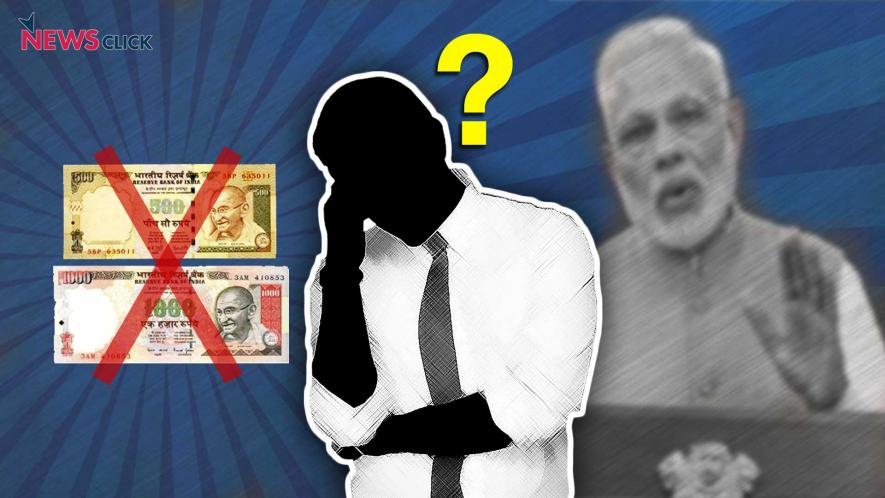A Damaging And Mindless Act

The retrospective defence being provided by the Government for its act of suddenly demonetising 86 per cent of the country’s currency is as mindless as the act itself. The main argument for demonetisation that was advanced a year ago was that ‘black money’-holders would not dare to bring their demonetised currency to the banks; this would make their hoarded wealth worthless and thereby cripple the black economy. The magnitude of such to-be-disabled wealth was estimated to be around ₹3.5 lakh crore, and since such disabling would simultaneously be a windfall for the Reserve Bank of India, whose liabilities would go down correspondingly, and hence indirectly for the which owns the RBI, various ways of using this windfall were triumphantly discussed by Hindutva spokesmen.
This, as many economists pointed out then, was an utterly naïve idea. First, it was based on a confusion between stocks and flows. The ‘black economy’ consisted of a set of undeclared activities which generated incomes and employment. Operating such activities, like any other, required cash-stocks; but these were only a fraction of the total income-flows generated by them. Disabling such cash-stocks, therefore, which, unlike in Bollywood films highlighting currency-stuffed pillowcases and mattresses, did not constitute the essence of the black economy, would at best administer a pinprick, but would not cripple it. Secondly, the black economy would always find ways of exchanging its old notes for new ones without being too inconvenienced by the fact of demonetisation.
More than naive
With the RBI’s much-delayed admission that only about ₹16,000 crore of demonetised currency has not returned to the banking system (and much of it obviously has little to do with the black economy), the naivete of the Government’s conception is clearly exposed. And when such naivete knowingly destroys the life-line of the informal economy which accounts for about 45 per cent of GDP and 85 per cent of total employment, then it constitutes sheer mindlessness.
Equally mindless is the retrospective justification for demonetisation that is now being officially advanced, after the publication of RBI figures. Arun Jaitley has suggested that it was not the non-return of demonetised notes that the Government was banking upon but their very return, that is, that the idea all along had been to “flush out” old currency from the system. This, apart from being simply untrue, does not explain how such “flushing out” could conceivably hurt the black economy, and why demonetisation had to occur at four hours’ notice if merely “flushing out” old notes was the objective.
The number of investigations that income tax authorities can now launch against those who have turned in large amounts of cash after demonetisation, is sometimes adduced as a blow against the black economy. But these investigations, apart from hurting many innocent persons, will also take ages to complete. And launching selective income tax investigations which is what an assault on the black economy needs, did not require such a draconian measure.
Two additional arguments for demonetisation had been advanced then, which became more prominent as the claim that it was attacking black money started losing credibility. These too, however, were mindless.
Further failed arguments
One mentioned getting rid of counterfeit currency. But since the Indian Statistical Institute’s study had estimated the magnitude of such currency to be a mere 0.025 per cent of total currency, demonetising 86 per cent of total currency for this purpose was obviously mindless. And anyway the counterfeit currency that has returned to the banking system is only 5 per cent of the ISI estimate.
The other argument talked of the need to encourage cashless transactions. But since cashless transactions entail a cost unlike cash transactions, people should enter into the former voluntarily; forcing them into such transactions betrays mindless authoritarianism. Some have seen in demonetisation, and also in GST, a general class-assault on the informal economy on behalf of the corporate sector that is dear to the Modi government. But I would attribute it to mindlessness since a gratuitous and direct assault on the informal sector by the state, as opposed to the state’s just facilitating an encroachment on this sector by the corporates, produces a general crisis encompassing both sectors through the operation of multiplier effects. This is exactly what we are witnessing in India.
Some believe that with remonetisation, the economy should get back to square one, with demonetisation having no lasting effects. This is erroneous: petty producers and traders have incurred larger debt during the period of cash-shortage; and these would leave a permanent mark on their economy.
Get the latest reports & analysis with people's perspective on Protests, movements & deep analytical videos, discussions of the current affairs in your Telegram app. Subscribe to NewsClick's Telegram channel & get Real-Time updates on stories, as they get published on our website.
























